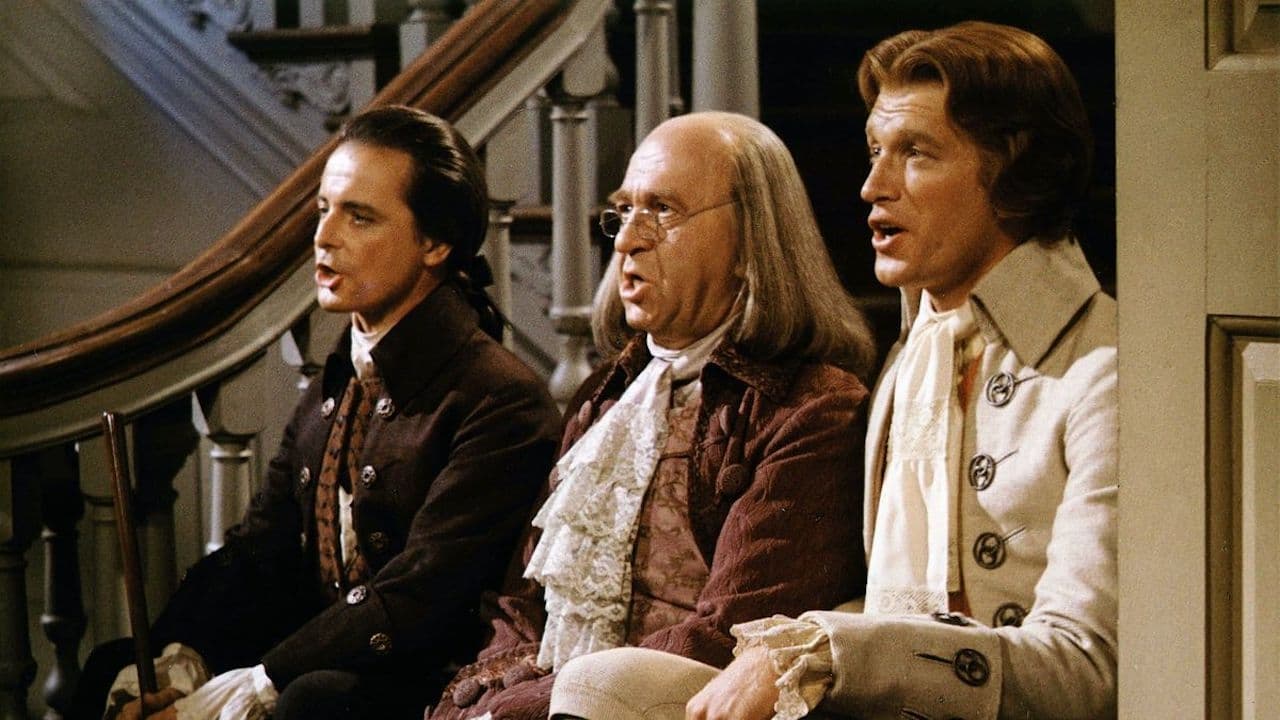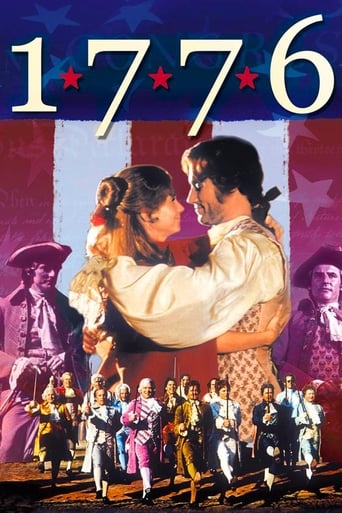

Tied for the best movie I have ever seen
... View MorePurely Joyful Movie!
... View MoreIt’s fine. It's literally the definition of a fine movie. You’ve seen it before, you know every beat and outcome before the characters even do. Only question is how much escapism you’re looking for.
... View MoreActress is magnificent and exudes a hypnotic screen presence in this affecting drama.
... View MoreWilliam Daniels as John Adams was a part he was meant to play. His intensity throughout the movie was exceptional. It conveyed the true sense of urgency that the colonist had at the time to escape the oppressive British rule. Howard Da Silva was terrific as Benjamin Franklin. He portrayed his wit and wisdom perfectly. I also loved Ken Howard as Thomas Jefferson. I'll always know him as "The White Shadow" but he showed his incredible acting range here. As a history and classic movie buff, I had to give this a 10 for the fine performances and great American history.
... View MoreBeing a fan of history in general, and American history in particular, I fully expected to love this film. Unfortunately, for me at least, there are several troublesome factors here that take this one down a few pegs.The history itself is seriously spotty. Too many to list, but for one, Adams and Franklin were NOT buddies, so to see them cavorting side-by-side was an odd sight indeed. It is well known Adams despised Franklin (he despised a lot of people actually). There are many minor/trivial oddities here as well - things like Martha Jefferson showing up in Philadelphia (she did not); Jefferson writing the Declaration as we know it today (in truth much of the wording was altered by the Committee); Cesar Rodney shown here on his deathbed (he lived for 8 more years); Franklin saying he founded the first abolition society in the new world (he did not). I can go on, you get the point. I don't find all of these inaccuracies to be a 'big deal' - however when I read other reviewers here refer to this film as a 'great history lesson' - well, now it becomes one. Because the reality is, like many films, '1776' is NOT a history lesson and should not be viewed as such. It is a play set in a historical place and time, but as with many other films and plays, a heavy dose of dramatic license has been applied here and that needs to be understood.That in itself wouldn't be too bad. However, there are a few more issues....for a musical with something like 15 songs, an alarming number of them aren't particularly good or catchy or noteworthy. There are a few good ones, yes, but only a few. I am hard-pressed to name a musical that has less memorable music than this one. If I were to watch this again (something I'd probably not do as I now contemplate it), I would definitely fast-forward over some of the lesser songs. That is not a good thing for a musical, needless to say.Speaking of fast-forwarding, another reason I'd do it is that at nearly three hours, the film is just too darn long for its own good. I am not against lengthy films, but generally longer films are usually associated with epic story-telling on a grand scale. There is nothing grandiose with 1776, virtually the entire film is set in the Congress chamber (not surprising as this was adapted from a play). With several sub-standard musical numbers here, though, it makes the film a chore to sit through for that long. Jack Warner was right to cut this film in 1972, that version is probably more palatable than the director's cut.Some of the humor in this was excellent, probably the best part of the film. While the Adams character was the main protagonist, Franklin was by far the funniest. And I will say I was surprised at the frequency of sexual innuendos in the film. Not a bad thing, as I mentioned some of the puns were quite funny, but not something for 'the kids' to watch I'd say, if they managed to understand (Franklin's line that 'at my age the pen is mightier than the sword' comes to mind).Overall, not terrible but not great. I don't think I'd watch this again, but if I did I'd skip maybe 8 of the songs. That speaks volumes, and what it says isn't especially complimentary. If this were to be redone with new and better songs it would make it more deserving of the 'classic' moniker some strive to give it now. In its current form it's a tad lacking. 6/10.
... View MoreHi,Blythe Danner and her glorious singing of He Plays The Violin is reason enough to see this movie.As for the movie it self, it's a charming representation of the events that brought about the birth of this nation. See it as a child would, and revel in the joy it gives you, but put aside the seriousness of a dusty old pucker-puss professor of history. For those of us who are inclined to look beneath the surface, you will find here the motivations that moved these men, step by step, to commit themselves to revolution.See it when you want to feel good. You may even learn something in the processes.Tony
... View MoreAt the end of "1776," I was restless, extremely bored, and stunned into disbelief. What shocked me was not the way some of the most important men and events in American history were presented in this film, but what had happened the joyfully self-parodying part-comedy that I had been enjoying so boundlessly just an hour and a half before. At the beginning "1776," I was giggling, slapping my knee, and even humming along to some admittedly campy but delightful songs. It did not bother me that John Adams, Benjamin Franklin, Thomas Jefferson, among others were being represented as clowning windbags. I was having a good time. And I kept on laughing for about an hour and twenty minutes. Then the film changed gears, the songs lost all their punch, and Director Peter H. Hunt completely abandoned his sense of pacing."1776" is based on the phenomenally successful stage musical that ran on Broadway for three years. It was directed by the same man and features most of the same cast. Two of the actors--Ralston Hill and Charles Rule--made their only film appearances in this movie. Being a musical, the stage production--and film--was part-comedy, so the dialogue pokes fun at the Founding Fathers of the United States. John Adams, as played by William Daniels, is an unctuous and arrogant little man with a dream of independence. Howard Da Silva plays Ben Franklin as a big-hearted, enigmatic old man. Thomas Jefferson is presented by Ken Koward as a dreamy-eyed writer who would rather rush home to his wife in Virginia than stay and write the Declaration of Independence. There's even Roy Poole, played exuberantly by Stephen Hopkins, who needs to have the rum hidden from him during all congressional meetings. These caricature performances unquestionably will, and have, angered some. But that did not irk me. I didn't even have any qualms with the movie's implication that Thomas Jefferson overcame writer's block by kicking John Adams and Ben Franklin out of his house while he had sex with his wife. There's a classic moment where he gives Adams a letter saying that he'll write the Declaration after he "takes his wife back to bed, so please go away." All Adams can say with a dry voice is: "Incredible!" Franklin, meantime, chuckles under his breath.In fact, the caricatures were part of what made me enjoy the first half of the movie so much. These actors are clearly have the time of their lives poking fun at American figures. In particular, Mr. Daniels is very entertaining as John Adams. The way he struts around like a proud peacock, his cane always thrusting at his side, and never changes his expression once be he angry, excited, or even remorseful. It is a shame that this very-good actor is basically unknown in the world of film outside of this film and "The Graduate." The banter that Mr. Daniels and Mr. Da Silva have is giddily funny, as the latter's laid-back personality counteracts the former's sternness...even if it is hard to believe that a man this lazy and care-free could have had the patience to invent the lightning conductor.I was also getting a kick out of the cheesy songs. There is one sung by Ron Holgate (as Richard Henry Lee) in which he quips his surname to adjectives, such as "certain-Lee!" and "absolute-Lee!" Sure, it's goofy, but it's consciously goofy. The opening number, "Sit Down, John!" is also good. And although I could not quote the lyrics, the resurfacing number that plays when John Adams and his wife (Virginia Westoff) has a very soothing and uplifting musical score in the background which I found intoxicating to listen to over and over again. In fact, I found myself pretending there was no singing, just the music.So there's some joyous acting, giddy songs, and big laughs. The only problem is that that only lasts for the first part of the picture. After that point, when Congress goes into a heated, several-reel debate about independence, does the movie lose its head. There are some great moments, such as when Adams, Jefferson, and Franklin stand up against those who wish to remove the clause absolving slavery. A bold move on the filmmakers' part is not placing an African American anywhere in sight, but talking about them and the issue. However, the rest of the sequence is just dry with what looks like static rehearsal shots filmed from too far away where some close-ups would heighten a sense of claustrophobia.Furthermore, and for the worse, the songs go sour and double their numbers. Characters with little purpose take unneeded possession of center stage. The key example is an unbearably dull song featuring the secretary McNair (William Duell) and a recurring Army scout. The drab lyrics, coupled with over-emphasized candle lighting, drag the scene out without mercy. Equally boring is a midway number where opposition to the Declaration step out into the streets and enunciates instantly forgettable lines. The subject matter? I can't remember, and I'm not ashamed to admit it. That is the mark of a bad song, when you cannot even recall the subject. Whereas I can instantly tell you that "Rum and Molasses" was about the slavery issue and "The Egg" was about getting Congress to approve the Declaration.The second half of the movie, shot in excessive wide-angles, peters out and destroys all of the momentum, energy, and zest that infused the first part. Even the final scene, composed of nothing but the Congressmen writing their names, goes on forever. "1776" is one of those films that I really wish I could say I liked, because I did for quite a while. And it stunned me that the second half could be so bad when the first half was so good.
... View More